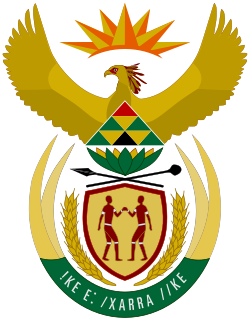| Electoral Amendment Act, 2023 | |
|---|---|
 | |
| Parliament of South Africa | |
| |
| Citation | Act 1 of 2023 |
| Territorial extent | South Africa |
| Passed by | National Assembly |
| Passed | 20 October 2022 |
| Passed by | National Council of Provinces |
| Passed | 29 November 2022 |
| Signed by | Cyril Ramaphosa |
| Signed | 13 April 2023 |
| Commenced | 19 June 2023 |
| Legislative history | |
| First chamber: National Assembly | |
| Bill title | Electoral Amendment Bill |
| Bill citation | B1-2022 |
| Introduced by | Aaron Motsoaledi, Minister of Home Affairs |
| Introduced | 9 January 2022 |
| Passed | 20 October 2022 |
| Voting summary |
|
| Second chamber: National Council of Provinces | |
| Bill citation | B1B-2022 |
| Received from the National Assembly | 20 October 2022 |
| Passed | 29 November 2022 |
| Final stages | |
| National Council of Provinces amendments considered by the National Assembly | 22 February 2023 |
| Voting summary |
|
| Finally passed both chambers | 22 February 2023 |
| Status: In force | |
The Electoral Amendment Act, 2023 (Act 1 of 2023) is legislation aimed at reforming the electoral laws and regulations in South Africa. Its primary purpose is to address specific issues and challenges in the country's electoral process, ensuring that it is more inclusive, representative, and democratic. [1] [2] [3]
